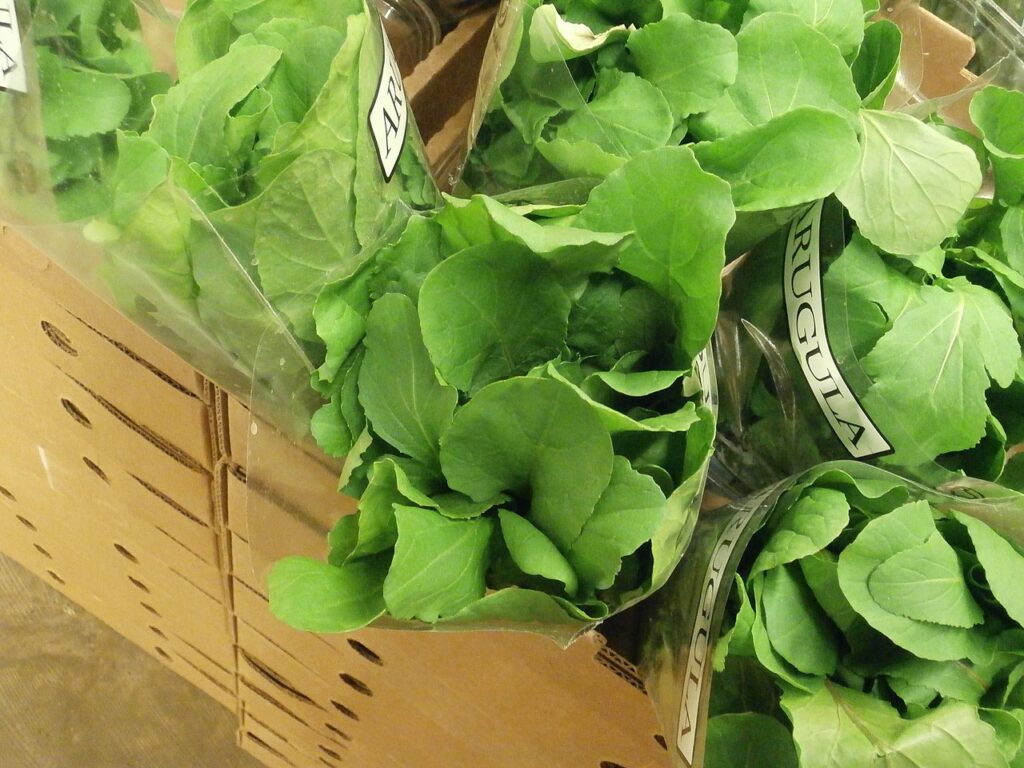If you’re a dog owner, you may be curious about which human foods your furry friend can safely consume.
Arugula is a leafy green vegetable that’s gained popularity in recent years, thanks to its spicy flavor and nutritional value. But can dogs eat arugula, or is it better left on our plates?
In this article, we’ll explore the safety and potential health benefits of feeding arugula to dogs.
- Can Dogs Eat Arugula?
- How Much Arugula Can Dogs Eat?
- How Often Can Dogs Eat Arugula
- Health Benefits of Arugula To Dogs
- Potential Risks of Feeding Arugula To Dogs
- Nutritional Benefits of Arugula For Dogs
- Are Dogs Sensitive To Arugula?
- How To Prepare Arugula For Dogs
- How Fast Will Dogs Digest Arugula
- FAQs
- In Conclusion
Can Dogs Eat Arugula?

Yes, dogs can eat raw and cooked arugula, and it’s generally safe for them to consume in moderation.
Arugula is a natural, nutrient-dense food that can offer your dog a range of health benefits. It contains vitamins A, C, and K, as well as calcium, potassium, and iron.
Arugula is also low in calories and high in fiber, which can support your dog’s digestive health.
However, as with any human food, it’s important to feed your dog arugula in moderation and to introduce it gradually, monitoring their response for any signs of digestive upset or allergies.
Additionally, you should ensure that the arugula is thoroughly washed to remove any potential contaminants or pesticides.
See also: 47 Safe Vegetables To Feed Your Dog. Puppy Power!
How Much Arugula Can Dogs Eat?

While arugula is safe for dogs to consume, it should only be fed to them in moderation.
The general rule of thumb is to make sure that any human food you’re giving to your dog makes up no more than 10% of their daily caloric intake.
A small portion of arugula as a mix-in or treat is usually sufficient, and should not make up a significant portion of their daily diet.
If you’re unsure about how much to feed your dog, consult with your veterinarian for guidance.
Additionally, it’s important to avoid adding any seasoning or dressing to the arugula that you’re feeding your dog, as these ingredients may be harmful to them.
Can Dogs Eat Arugula
Arugula Feeding Chart According To Size
| Food | Size | Portion |
|---|---|---|
| Arugula | Toy dogs | 1 leaf |
| Arugula | Small dogs | 1 – 2 leaves |
| Arugula | Medium dogs | 1 – 3 leaves |
| Arugula | Large Dogs | up to 4 leaves |
Arugula Feeding Chart According To Age
| Food | Age | Portion |
|---|---|---|
| Arugula | 0 – 6 months | Don’t feed |
| Arugula | 6 – 12 months | 1 leaf |
| Arugula | 12 – 24 months | 1 – 3 leaves |
| Arugula | 24+ months | up to 4 leaves |
How Often Can Dogs Eat Arugula
Arugula, like any human food, should only be given to your dog in moderation, even if they love it.
As a general guideline, it’s recommended to offer small portions of vegetables, including arugula, as a treat or occasional supplement to their regular diet. In other words, arugula should never make up a significant portion of their daily food intake.
Feeding your dog arugula once or twice a week can be a healthy supplement to their overall diet, providing added nutrients and fiber.
It’s always a good idea to consult with your veterinarian to determine how often you can feed your dog arugula, as their individual nutritional needs may vary.
Health Benefits of Arugula To Dogs
- Rich in Nutrients. Arugula is a nutrient-dense food that’s loaded with vitamins and minerals that can support your dog’s overall health. It contains high levels of vitamins A, C, and K, which are essential for healthy vision, immune system function, and blood clotting, respectively. Arugula also contains calcium, potassium, and iron, which can support bone and muscle health and promote oxygen transport throughout the body.
- High in Fiber. Arugula is high in fiber, which can help regulate your dog’s digestive system and promote healthy bowel movements. A diet that’s high in fiber can also help your dog feel full and satisfied, which can prevent overeating and unhealthy weight gain.
- Low in Calories. Due to its low-calorie content, arugula can be a healthy addition to your dog’s diet. It can provide essential nutrients without contributing to excessive calorie intake.
- Anti-Inflammatory Properties. Arugula contains a variety of beneficial compounds that have anti-inflammatory properties. These compounds can reduce inflammation in the body, which can be beneficial for dogs with certain inflammatory conditions, such as arthritis.
- Supports Liver Health. Arugula contains compounds that can support liver function, which is essential for overall health and well-being. These compounds can help to promote healthy liver enzyme activity and protect against oxidative stress, which can be especially important for dogs with liver disease.
Potential Risks of Feeding Arugula To Dogs
- Digestive Upset. Introducing any new food to your dog’s diet can sometimes cause digestive upset, including vomiting, diarrhea, and stomach pain. Arugula, despite being generally safe for dogs, can cause digestive upset if fed in excessive amounts or if your dog has a sensitivity or allergy to it. Take care to introduce arugula gradually and monitor your dog’s response for any signs of digestive upset.
- Pesticide Exposure. As with any leafy green vegetable bought from your local grocery store, arugula can contain trace amounts of pesticides. It is crucial that you always thoroughly wash any vegetable you wish to share with your furry friend, however, washing may not completely remove pesticide residues. Thus, to reduce the risk of pesticide exposure, it is better to try to feed your dog some organic arugula.
- Thiosulfate Toxicity. While arugula is a generally safe food for dogs, it’s also a member of the cruciferous family of vegetables, which contain sulfur compounds known as thiosulfates. In some exceptional cases, consumption of excessive amounts of thiosulfates can lead to thiosulfate toxicity, which can cause anemia and other health issues in dogs. Although rare, it’s important to monitor your dog for any symptoms of thiosulfate toxicity, including lethargy, vomiting, and trouble breathing, if you feed them large quantities of arugula.
- Allergic Reactions. Dogs, like humans, can experience food allergies or sensitivities to certain foods, including arugula. If your dog has a history of food allergies, or if you’ve never fed them arugula before, it’s important to monitor them closely for any signs of an allergic reaction after feeding them arugula. These reactions could present as itchiness, hives, or difficulty breathing, and may warrant a visit to the vet.
Nutritional Benefits of Arugula For Dogs
| Arugula Nutrition Facts per 100 grams | % DV * |
|---|---|
| Calories | 47 |
| Total Fat | 0.7 g |
| Cholesterol | 0 mg |
| Sugar | 1 g |
| Glycemic Index | 15 |
| Sodium | 94 mg |
| Carbs | 0.36 g |
| Protein | 0.2 g |
| Vitamin D | 0% |
| Calcium | 4% |
| Iron | 1% |
| Potassium | 36.9 mg |
Are Dogs Sensitive To Arugula?
While arugula is generally considered safe for dogs, some dogs may be sensitive to it, which can lead to symptoms of an allergic reaction or digestive upset.
These symptoms can vary in severity depending on the dog’s individual sensitivity level. Some potential symptoms of arugula sensitivity in dogs include:
- Vomiting
- Diarrhea
- Stomach pain or cramping
- Excessive gas
- Itching or scratching
- Red or irritated skin
- Hives or rash
- Difficulty breathing
If you feed your dog arugula and notice any of these symptoms, it’s important to discontinue feeding it to them and consult with your veterinarian.
They can help you determine if your dog is experiencing an allergic reaction or if there is another underlying issue causing their symptoms. If caught early, arugula sensitivity can often be managed through dietary adjustments and other supportive measures.
How To Prepare Arugula For Dogs
Fresh and Raw
Fresh and raw arugula can be a healthy treat or supplement to your dog’s regular diet. To prepare fresh arugula, simply rinse the leaves thoroughly with water to remove any dirt or debris, and chop them into small, bite-sized pieces. Then, offer the arugula to your dog as a snack, mix-in, or on top of their food.
Steamed or Boiled
Steaming or boiling arugula can make it easier for dogs to digest and can help to reduce the risk of digestive upset. To prepare steamed or boiled arugula, chop the leaves into small pieces and place them in a steamer basket or pot of boiling water for 4-5 minutes, until wilted. Allow the arugula to cool before offering it to your dog as a supplement or treat it in moderation.
Homemade Arugula Dog Treats
If you’re feeling ambitious, you can make homemade dog treats using arugula as one of the ingredients. There are many dogs treat recipes available online that call for arugulas, such as arugula and chicken jerky or arugula and sweet potato biscuits.
Just be sure to follow the recipe carefully and only offer the treats to your dog in moderation. Additionally, it is important to note that some homemade dog treats recipes can include ingredients that are toxic to dogs, always make sure to check with your vet before giving these treats to your furry friend.
How Fast Will Dogs Digest Arugula
The time it takes for a dog to digest arugula depends on a number of factors, including the dog’s breed, size, and digestive health, as well as the amount of arugula consumed.
Generally, raw arugula is more difficult for dogs to digest than cooked arugula. Digestion time also varies depending on the age, activity level, and overall health of your dog.
As a general rule, it can take anywhere from 8-24 hours for dogs to digest most foods, and arugula is no exception. This means that if you feed your dog arugula, it will take several hours for the food to move through its digestive system and be eliminated as waste.
Some dogs may have more sensitive digestive systems or have trouble digesting certain types of vegetables, including arugula.
If your dog experiences any digestive upset, such as vomiting or diarrhea, after consuming arugula or any other food, always consult with your veterinarian to determine the cause and the best course of treatment.
FAQs
Why do dogs like arugula?
Dogs love the taste of arugula because it has a unique and flavorful taste that dogs find irresistible. It is high in vitamins, minerals, and antioxidants which are beneficial to the general health of your pup.
It also contains an enzyme called myrosinase, which helps break down proteins into smaller components that are easier to digest. In addition, arugula contains a high concentration of nitrates, which can help reduce the risk of hypertension and cardiovascular disease in dogs.
In Conclusion
Arugula can certainly be a healthy addition to a dog’s diet when fed in moderation. It contains several essential vitamins and minerals that support healthy immune, bone, and muscle function, as well as anti-inflammatory and liver-supporting properties.
However, it’s important to ensure that the arugula is thoroughly washed to remove any pesticides or contaminants, feed it in moderation to avoid digestive upset and monitor your dog for any signs of sensitivity or allergies.
As with any human food, it’s also important to consult with your veterinarian to determine if arugula is appropriate for your dog’s individual nutritional needs. By following these guidelines, you can safely and effectively incorporate arugula into your dog’s diet as a healthy, nutrient-dense supplement or treat.





Leave a Reply